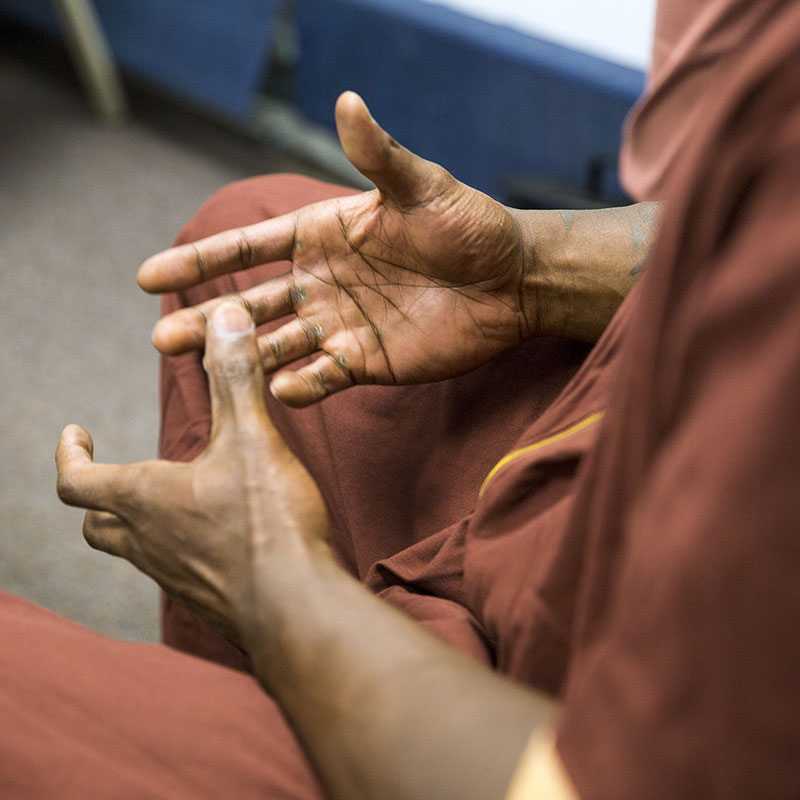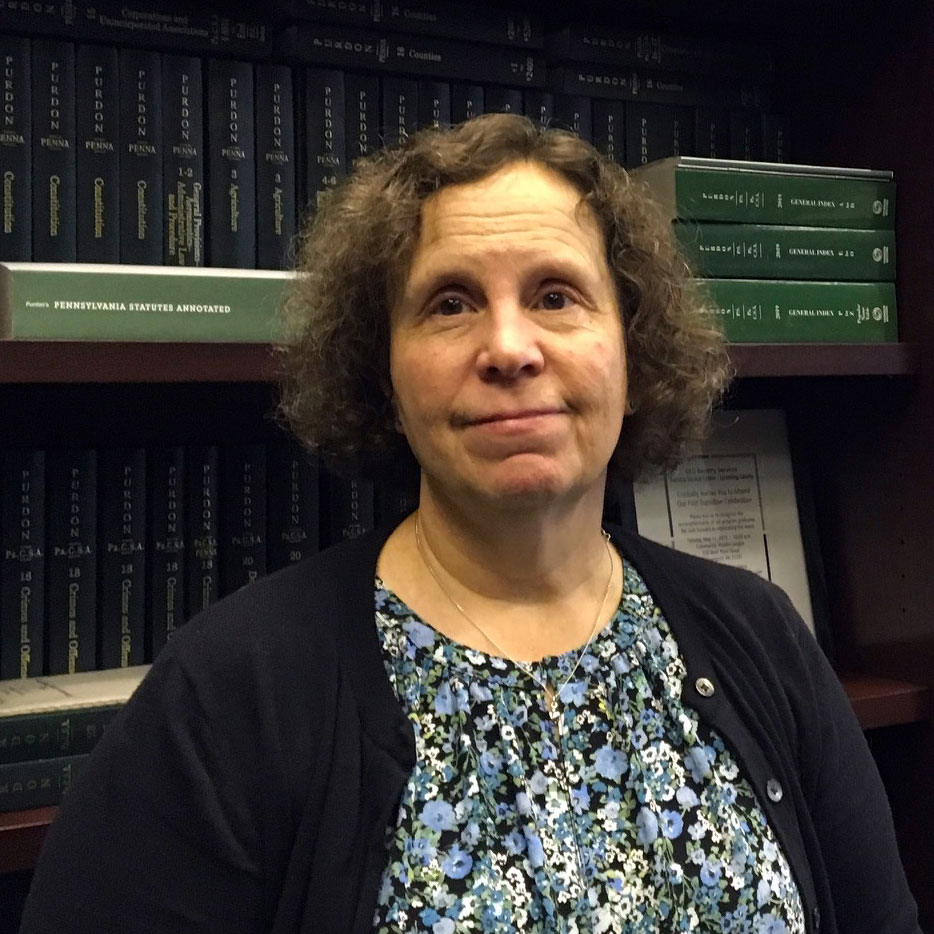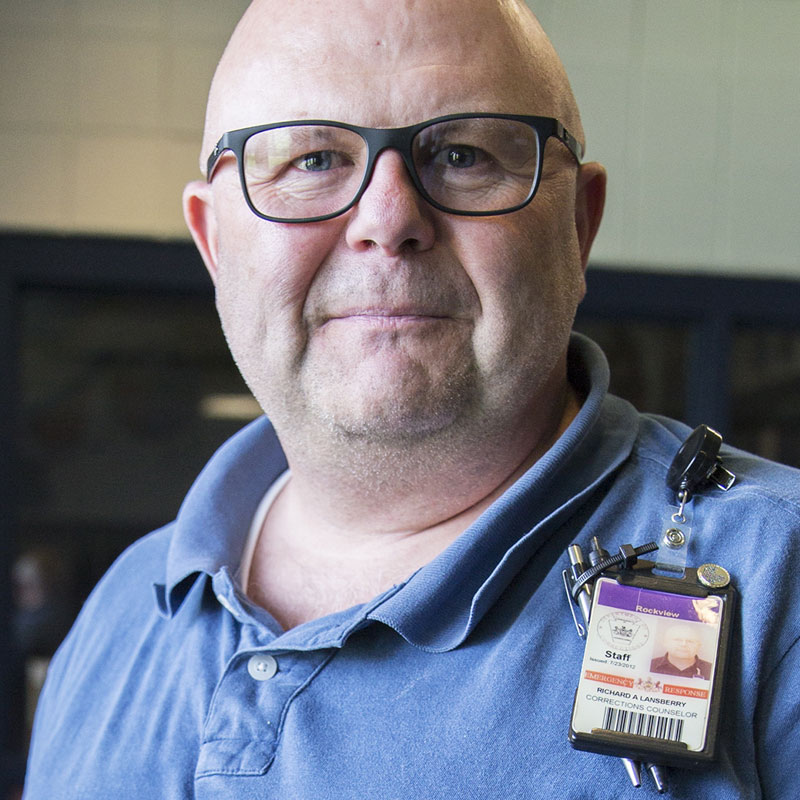Legal System Programs
The opioid epidemic has a broad and unforgiving reach, affecting families and friends, small towns and cities, schools and jobs. But it’s treated not only as a medical problem, a disease or addiction, but as a crime. Learn more about how the legal system is transitioning in response to the opioid epidemic.
Anne Danahy (Narrator) – The opioid epidemic has been unforgiving. But it’s treated not only as a medical problem, a disease or addiction, but also as a crime. That’s where the legal system comes in.
I’m Anne Danahy. This is “Overcoming an Epidemic: Opioids in Pennsylvania,” a WPSU podcast looking at what researchers, communities and government agencies are doing to try to treat and prevent opioid addiction.
[Drug Court graduation, people talking]
AD – The people exchanging thank yous, stories and hugs in the Lycoming County courthouse in downtown Williamsport have just graduated from Drug Court.
Among them is Kelsey Augustine.
KA – I’ve been in the program for four years.
AD – Augustine found herself in the court system after she began working in a pharmacy. She wasn’t using drugs when she started the job.
KA – It was opportunity met desire.”
AD – She says she began stealing — opiates, methadone, whatever she could get her hands on. Before long, she was hooked.
KA – I was taking people’s prescriptions. I was taking people’s fentanyl patches. Just basically anything that, whenever I was alone, I just thought it was a free for all.
AD – Did you feel like you needed it?
KA – I definitely felt like the physical part of me needed it. But mentally I just wanted to be I just wanted to be high all the time.
AD – She got caught and ended up in jail for a week, then out on probation. But, she didn’t stop using and eventually ended up in Drug Court.
KA – When I started, it was just really, it was really scary. I was nervous going in front of everybody. Quickly that dissipated, but then I just became so complacent with where I was that I was just accepting, This is my life, and this is what it is. And when we get complacent, we use. So, that’s what happened to me.
AD – So she ended up using while in the Drug Court program. But she told her probation officer she needed help. She went to jail.
AD – You actually turned yourself in.
KA – I did.
AD – Because you didn’t want to do it anymore?
KA – It was so crazy. My life was so crazy. I was taking 10 strips of acid on a weekly, almost every three day basis. I was a crazy person. I was like a psycho. It was not not good. And I needed to stop. But I couldn’t stop on my own.
[Music]
AD – A drug court is one of Pennsylvania’s “problem-solving courts.” There are others, including DUI Court.
Drug Courts offer intense oversight. Participants have regular meetings with the judge and probation officers, have to go to self-help meetings and get frequent drug and alcohol tests. Treatment court is typically offered to someone who may be on probation but tests positive for drug use, or has new charges brought against them.
Nancy Butts – My name is Nancy Butts. I’m the president judge here in Lycoming County. And I’m the treatment court judge.
AD – I’m in Judge Butts’ chambers after the court graduation. Lycoming County has had a Drug Court for more than 20 years.
NB – Butts is known for being interested in each person who comes through her courtroom. She’s modest about it, saying judicial interaction is one of the parts of having an accredited drug and DUI court program. She says that means connecting with the people in her courtroom.
NB – Motivational interviewing is a real tool that I like to use to get people to say things out loud, so that they can hear what they’re thinking.
AD – I see that in action. You’re not allowed to record in Pennsylvania courts, but you can observe.
One man in treatment court was found to be drinking alcohol. Butts asks him about why he’s struggling, but he says he isn’t. She says that it seems like he is and asks him why he didn’t reach out for help. Finally, she tells him: “I don’t feel comfortable moving you to Phase 3, because I don’t think you’re ready.”
All of this — the graduation, the monthly check-ins, the discussion with people who aren’t doing as well — happens when other participants are there too. Butts says that gives people in treatment court a chance to see others finishing the program or moving to the next level; or a chance to look back at what they’ve been through.
NB – Where you’ve got people sharing where they are now and talking about like when they see somebody coming up who was in jail, and making reference to that saying, ‘I remember when I was in jail, and I thought I would never be able to be here. And I see them now and think oh, my gosh, how far I’ve come,’ or ‘I never want to go back there again. And that just reminds me how much I don’t want to go back there again.’ So when we have all those different kind of things happening in the courtroom, I just think it really just reinforces everybody’s commitment to recovery that way.”
AD – Butts also reminds those in court that success can come in many ways.
NB – It’s just living one more day drug and alcohol free. And then you’ve also not substituted your drug and alcohol addiction with some other inappropriate coping mechanism.
[Music]
AD – Today, Augustine and others graduate. Butts reads what their probation officers have written about them, and the graduates speak about getting through the program and their upcoming plans before getting their certificates.
One graduate says: “I messed up a lot in this program … you gave me chances and believed in me, so I believed in myself.”
Augustine thanks everyone who helped her and held her accountable.
After court, she says she’s going to work the next day, will keep going to 12-step meetings and will keep on with her life.
KA – And that’s just really what it’s all about, you know, the whole program is about, you know, reshaping yourself and being able to be that person to help somebody else who’s new. And that’s just what I want to do.”
AD – Shea Madden is the executive director of the West Branch Drug & Alcohol Abuse Commission, which handles case management for Lycoming and Clinton counties’ drug courts. She says participants don’t necessarily have to totally buy into the program right from the start.
Shea Madden – We’ve certainly taken some very difficult cases, that we were about a second away from kind of throwing in the towel. And then something changed. At some point, for some reason, you know, whatever time length into the program, whether it’s six months or a year, something shifts.”
AD – She says there has to be some motivation, and that could be just to stay out of jail.
SM – I think for a lot of folks, they haven’t had that, you know, cheerleader for lack of a better word, but you know, that constant person or group of people that mean what they say and follow through and are there regardless of whether you’ve just, you know, cursed them out. you know. They’re still standing there willing to help you, if you will accept the help. So I think that’s a big piece of it. And I do just think seeing that you can do things differently.”
[Music]
AD – About eight years ago, the Pennsylvania Department of Corrections started what’s known as a Certified Peer Specialist program or CPS. It began with a pilot, and now it’s in all of the state prisons.
The idea is to train inmates to provide support to other inmates. It’s along the lines of a sponsor in a recovery program. It doesn’t replace the counselors or doctors inmates might be seeing, but supports them.
It’s happening as the number of inmates going into the state system with opioid addiction has more than doubled since 2010.
[prison door opening]
Al – Recovery, it’s been a little bit of a miracle for me, right, what I’ve experienced.
AD – That’s Al. We’re only using his first name because he’s an inmate in a Pennsylvania state prison. He’s serving time for third-degree murder.
Al has been a CPS for about five years. He says he initially wanted to do it to have a good job. (He’s paid about 50 cents an hour, the top rate for prison inmates.)
“It became a lot more than I expected it to be. I found that helping others really helps me too. That was kind of an awakening for me.”
[People walking in a prison]
AD – Lynn Patrone, who directs the peer program, says the system is modeled on ones that had been in the community at large. Those programs evolved out of the mental health movement and deinstitutionalization.
Lynn Patrone – Someone’s having a difficult time, and maybe they’ve just seen the psychologist. But they would benefit from peer, somebody who had that like experience. So they really benefit from that program.
AD – While focused on mental health issues, addiction is often part of that.
LP – They’re really working on holistic life skills, coping skills that will help an individual regardless of what they’re going through.
AD – Richard Lansberry, has worked at Rockview since 1998. He started as a corrections officer and became a counselor in 2011.
AD – He says he saw a transformation in inmates he didn’t think would make it through the program from the first training that was offered.
Richard Lansberry – They were saying it, telling us, in the class, ‘Like, wow, you know I never saw myself like this before. And now that I do, I see I’ve not been living to full potential.’ They were saying things like this. And their language changed, and their bodies changed, and their facial expressions changed. They were more positive. They were more energetic, in this atmosphere that‘s usually not very positive and uplifting, they found it in themselves. And I was like, that’s amazing.
AD – And while that might sound idealistic or even naive, the inmates say the same types of things.
[prison door]
Arthur – It’s gratifying. It leaves me to be happy with who I am, and that I can really make a difference no matter what I’ve done to get put in here.
AD – Arthur is serving time for a homicide when he was a juvenile.
Arthur – I think, for the most part, I didn’t know who I was, and that’s what held me back for most of my time within my own recovery. So, finding who I was and loving who I am now was what that program helped me do.
AD – And, the program has helped him with accountability.
Arthur – Because if I’m holding myself accountable in every aspect of life, then I can lead by example and show others how to do the same thing.
AD – He and others described going through the required two-week training as intense.
Jeffrey – The first three days, I was ready to quit.
AD – Jeffrey is another inmate. He’s serving his 41st year in prison and has been part of other programs in the past. He says he had an “epiphany” during the CPS training.
I wanted to continue what I used to do. Although, what I used to do is tell people what to do. I used to try to fix people. In this class, I learned that wasn’t the way peer support works. I was no longer supposed to fix people’s lives. I was supposed to let people fix themselves, to find their own power, you know, and to realize who they were.
AD – To participate, inmates have to be misconduct-free. They also have experienced mental illness and are in recovery from it. Some have experienced both mental illness and addiction.
Al, who we heard from earlier, says he struggled with addiction. And being a CPS means being part of the solution and helping yourself.
Al – I used the terminology, two dead batteries can’t start a car, right. We got to walk around juiced up, so we can give guys jumps, right. But there’s a time where you have to make sure your batteries are charged. … Sometimes you actually get a charge from somebody too.
[Music]
AD – A peer specialist is certified by the state board. There are now about 600 certified peer specialists across the entire prison system. They work in shifts and are scheduled so that someone is available to talk to another inmate 24-7.
If an inmate wants to talk to a CPS, he can reach out to the one who is on duty or tell a guard he wants to talk with one of them. Corrections also plans to get the CPSs T-shirts so it will be easier for inmates to find them.
David, an inmate and CPS, says they can talk about topics ranging from sports to suicide prevention.
AD – “You’ve actually talked with someone in that situation, who was talking about suicide?”
David – Yes.
AD – What was that like?
David – It was almost like talking to myself. Because I was in a situation like that personally. So, it was easy for me to relate, and it was easy for me to see past where he was at that moment. Because I got through it, so I felt like he can get through it too.”
AD – The program was not immediately embraced by everyone. The inmates and staff I talked with said there were people from both groups who were skeptical. Counselor Richard Lansberry says some inmates thought the trained ones were just snitches. Some staff questioned whether it would help the inmates become better criminals.
But, they moved ahead, eventually winning over skeptics.
Jennifer Alexander – Prior to being a unit manager, I was a psych staff at another facility and it took me a little while to buy in.”
AD – Jennifer Alexander oversees daily operations of Rockview’s residential treatment unit. It has inmates with serious mental health issues, and there are 144 the day I visit.
AD – Why were you resistant to it or skeptical?
JA – Because I went through years and years of training to do what I did. I didn’t see how a two-week program could do the same thing.
AD – So you were like, How are these inmates who’ve just been trained for two weeks, how are they going to make a difference?
JA – I went to school for six years, how can 75 hours compare to the amount of education that I got, and it has nothing to do with education.
AD – She’s been a unit manager at Rockview for about six years. She says about a half-year in, her opinion of the program began to change. She started to see how some of the inmates became more open to talking with a peer.
“I saw what they were doing. I saw how me standing in a door didn’t deescalate an inmate that was housed out there, and a psych staff standing in a door and talking to the same inmate didn’t deescalate the situation, but having Alan, who was in here, come out and talk to the inmate. All of a sudden, everything’s good, and we don’t have to remove the inmate from the cell, we don’t have to use any kind of force to gain compliance. It was a conversation between two inmates, and all of a sudden everything is OK.”
AD – Alexander says that saves the state time and money.
Corrections spokeswoman Sue McNaughton has an answer to whether the program is too soft on inmates serving time, often for serious crimes.
“An individual coming to prison is the punishment. And we have to treat these individuals as the individuals and humans they are. Our goal for those that are going to be returning to society is to make them a better person than when they came to us.”
[Music]
AD – The Pennsylvania Department of Corrections is also changing how it handles medical treatment for inmates who are addicted to opioids or being treated for addiction.
To find out more, I talked with the person who oversees the programs.
Steve Seitchik – My name is Steve Seitchik. And I am the medication-assisted treatment statewide coordinator.
AD – Seitchik explained that starting June 1st of this year, inmates going into the system who are already on a verified medication-assisted treatment or MAT can continue that treatment in prison.
That’s a change. And it comes as more people enter prison with opioid addictions. According to a Department report, since 2010, the number of new admissions with an opioid addiction has more than doubled.
AD – Kind of a big picture question. Why are you doing it? Why do you think it’s important?
SS – Medication for opioid use disorder is really considered the gold standard of treatment, combined with psychosocial counseling services. For me, it’s a matter of life and death. Medication has been proven to be incredibly effective, specifically for opioid use disorder.
AD – The Department of Corrections plans to continue to expand the program, so eventually MATs will be available even to inmates who don’t enter the system with prescriptions. Seitchik did not have a timeline for when that will take effect. Instead, he said, they’re slowly expanding the program.
SS – The goal is we’re able to offer all three FDA-approved medications and we’re able to offer it at every single location for individuals, whether they’re coming in, leaving or already in our system.
AD – Seitchik says there is still an undeserved stigma surrounding MATs.
SS – People like to use anecdotal stories to talk about negatives, a negative side of MAT. I like to focus on science. Our decisions are really based on what is science telling us. And, obviously, I’m going to use science and research to guide my decision making.
AD – Science and research, he and others say, point to MATs. We’ll hear more about that in the next episode.
As of July 24, the Department of Corrections was treating 20 people who are being maintained on the MAT buprenorphine. Seitchik says the program just started, and he expects that number to grow.
And, more county jails will have this soon too. Seitchik said the state is awarding grants to county jails to implement MAT. The state just released $5.8 million to 16 county jails with a second round of funding expected in a year.
In the next episode, we’ll talk about warm handoff — a way of getting people into treatment and recovery and keeping them there.
“When patients want the treatment, and when they can access the treatment, and having the treatment available are three stars that need to align.”
This is “Overcoming an Epidemic: Opioids in Pennsylvania,” a production of WPSU. Reporters on the project include Emily Reddy, Min Xian and me, Anne Danahy. Cheraine Stanford and Frank Christopher edited the episodes. You can find more resources on the opioid crisis and what to do if you or a loved one need help at wpsu.org/opioids. For WPSU’s “Overcoming an Epidemic,” I’m Anne Danahy.
Drug Courts
Drug courts are a type of “problem-solving court” that offer intense oversight and interaction as an alternative to incarceration. Generally utilized for nonviolent offenders, drug courts combine regular meetings with a judge and probation officer with self-help meetings, frequent drug and alcohol tests, and aftercare. In Pennsylvania, there are drug courts in 35 of the state's 67 counties (as of October 2015).
Although critics argue that drug courts continue to incarcerate participants who fail to abstain from drug use, some long-term studies and The White House’s Office of National Drug Control Policy believe them to be a “proven tool for improving public health and public safety.”
A 2011 report from The Center for Rural Pennsylvania concluded that although quantification of cost savings and benefits was difficult, all counties surveyed reported budget savings in jail-days saved, lower recidivism rates and lower future victim costs.
For More Information
- Drug Courts: A Smart Approach to Criminal Justice Office of National Drug Control Policy
- Statewide and county statistics for Pennsylvania problem-solving courts’ caseloads and outcomes Pennsylvania Office of the Attorney General
- Specialty Courts in Rural Pennsylvania: Establishment, Practice and Effectiveness The Center for Rural Pennsylvania
Certified Peer Specialist Programs

In 2012 the Pennsylvania Department of Corrections started a pilot program to train inmates to support other inmates with mental health issues. Today the Certified Peer Specialist program has about 600 certified peer specialists across the state prison network.
A peer specialist must complete two weeks of training and meet other specific criteria including holding a high school diploma (or GED) and completing an evidence-based personal recovery program.
Although no research studies have been completed, according to Lynn Patrone M.Ed., director of the Office of Mental Health Advocate in the Pennsylvania Department of Corrections, qualitative evidence suggests that peer specialists reduce misconduct, are valuable for de-escalating crisis situations, and improve staff/peer relationships.
PA Dept of Corrections Medication Assisted Treatment or MAT
In June of 2019, the Pennsylvania Department of Corrections began continuing Medication Assisted Treatment (MAT) for inmates entering the system who were already on MAT for opioid use disorder. MAT combines counseling and behavioral therapies with the use of Food and Drug Administration approved medications to treat opioid dependence and addiction: Methadone, Buprenorphine, and Naltrexone.
“For me, it’s a matter of life and death,” says Steve Seitchik, Medication Assisted Treatment Statewide Coordinator, “Medication has been proven to be incredibly effective, specifically for opioid use disorder.”
Researchers say the bottom line is that Medication Assisted Treatment, coupled with counseling, works. Sarah Kawasaki, the director of Addiction Services at the Pennsylvania Psychiatric Institute points to evidence-based research that shows that MAT patients test positive for opioids at lower rates and that MAT saves lives.
For More Information
- Effective Treatments for Opioid Addiction National Institute on Drug Abuse
- Long-Term Follow-Up of Medication-Assisted Treatment for Addiction to Pain Relievers Yields “Cause for Optimism” National Institute on Drug Abuse Notes





